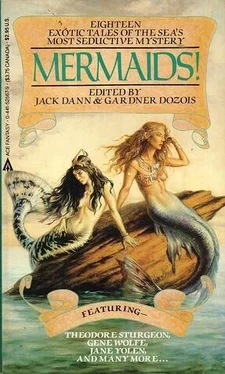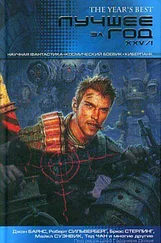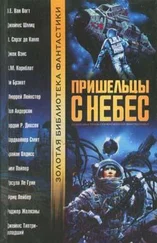They set up the camp stove in a level spot, sheltered by the trunk of a fallen palm tree. Morris cracked the conch and pounded it and threw it in the pan with shrimp. They drank beer while the combination cooked. They ate from tin cups, leaning side by side against the fallen palm.
"You can keep the skiff for yourself," Morris said suddenly. "I think that you can use it."
Nick looked at him, startled.
"I left my notes on your desk," Morris said. "They be as clear as I can make them."
Nick was studying his face. "I will go tonight," Morris said." My dad will come here to meet me." The sun had set and the evening breeze was kicking up waves in the smooth water. He drained his beer and set the bottle down beside the stove.
Morris stood and took off his shirt, slipped out of his pants. The gill slits made stripes that began just below his ribcage and ended near his hips. He was more muscular than Nick remembered. He stepped toward the water.
"Wait," Nick said. "Not yet."
"Got to." Morris turned to look at Nick. "There's a mask and fins in the skiff. Come with me for a ways."
Morris swam ahead, following the channel out. Nick followed in mask and fins. The twilight had faded. The water was dark and its surface shone silver. The night did not seem real. The darkness made it dreamlike. The sound of Nick's feet breaking the water's surface was too loud. The touch of the water against his skin was too warm. Morris swam just ahead, just out of reach.
Nick wore his dive knife at his belt. He always wore his dive knife at his belt. As he swam, he noticed that he was taking his knife out and holding it ready. It was a heavy knife, designed for prying rocks apart and cracking conch. It would work best as a club, he was thinking. A club to be used for a sudden sharp blow from behind. That might be enough. If he called to Morris, then Morris would stop and Nick could catch him.
But his voice was not cooperating. Not yet. His hands held the knife ready, but he could not call out. Not yet.
He felt the change in water temperature as they passed into deeper water. He felt something—a swirl of water against his legs—as if something large were swimming past.
Morris disappeared from the water ahead of him. The water was smooth, with no sign of Morris's bobbing head. "Morris," Nick called. "Morris."
He saw them then. Dim shapes beneath the water. Morris: slim, almost human. His father: man-shaped, but different. His arms were the wrong shape; his legs were too thick and muscular.
Morris was close enough to touch, but Nick did not strike. When Morris reached out and touched Nick's hand with a cold, gentle touch, Nick realized the knife and let it fall, watched it tumble toward the bottom.
Morris's father turned in the water to look up at Nick and Nick read nothing in those inhuman eyes: cold, dark, dispassionate. Black and uncaring as the eyes of a shark. Nick saw Morris swim down and touch his father's shoulder, urging him away into the darkness.
"Morris!" Nick called, knowing Morris could not hear him. He kicked with frantic energy, not caring that his knife was gone. He did not want to stop Morris. He wanted to go with Morris and swim with the dolphins and explore the sea.
There was darkness below him—cool, deep water. He could feel the tug of the currents. He swam, not conserving his energy, not caring. His kicks grew weaker. He looked down into the world of darkness and mystery and he sank below the surface almost gladly.
He felt a cold arm around his shoulders. He coughed up water when the arm dragged him to the surface. He coughed, took a breath that was half water, half air, coughed again. Dark water surged against his mask each time the arm dragged him forward. He choked and struggled, but the arm dragged him on.
One flailing leg bumped against coral, then against sand. Sand scraped against his back as he was dragged up the beach. His mask was ripped away and he turned on his side to retch and cough up seawater.
Morris squatted beside him with one cold webbed hand still on his shoulder. Nick focused on Morris's face and on the black eyes that seemed as remote as mirrored lenses. "Good-bye, Nick," Morris said. His voice was a hoarse whisper. "Goodbye."
Morris's hand lingered on Nick's shoulder for an instant. Then the young man stood and walked back to the sea.
Nick lay on his back and looked up at the stars. After a time, he breathed more easily. He picked up Morris's cap from where it lay on the beach and turned it in his hands, in a senseless repetitive motion.
He crawled further from the water and lay his head against the fallen log. He gazed at the stars and the sea, and thought about how he could write down his observations of Morris's departure and Morris's father. No. He could not write it down, could not pin it down with words. He did not need to write it down.
He put on the red baseball cap and pulled it low over his eyes. When he slept, with his head propped against the log, he dreamed only of the deep night that lay beneath the silver surface of the sea.











![Гарднер Дозуа - Книга Мечей (сборник) [litres с оптимизированной обложкой]](/books/427839/gardner-dozua-kniga-mechej-sbornik-litres-s-opti-thumb.webp)